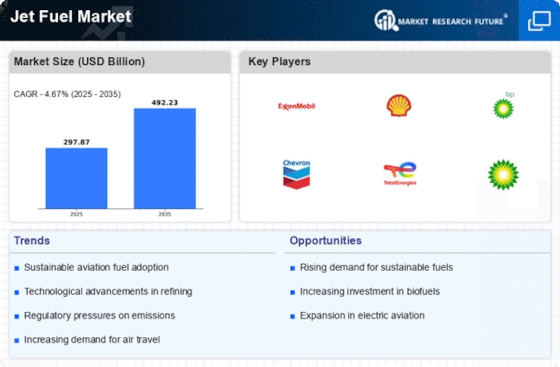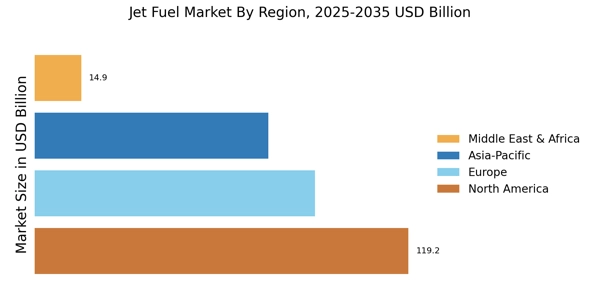Growth of Low-Cost Carriers
The rise of low-cost carriers (LCCs) is reshaping the Jet Fuel Market by increasing competition and expanding air travel accessibility. LCCs have revolutionized the aviation sector by offering affordable ticket prices, which has led to a surge in passenger numbers. This growth in air travel demand directly correlates with increased jet fuel consumption, as these airlines often operate on thinner margins and require efficient fuel management strategies. The expansion of LCCs is expected to continue, further driving the need for jet fuel and influencing market dynamics within the Jet Fuel Market.
Increasing Air Travel Demand
The Jet Fuel Market is experiencing a notable surge in demand due to the increasing number of air travelers. As economies recover and disposable incomes rise, more individuals are opting for air travel, leading to a projected growth in passenger numbers. According to recent estimates, the number of air passengers is expected to reach 8.2 billion by 2037, which will significantly impact jet fuel consumption. Airlines are responding to this demand by expanding their fleets and increasing flight frequencies, thereby driving the need for jet fuel. This trend suggests that the Jet Fuel Market will continue to thrive as long as air travel remains a preferred mode of transportation.
Regulatory Support for Sustainable Practices
The Jet Fuel Market is likely to benefit from increasing regulatory support aimed at promoting sustainable aviation practices. Governments are implementing policies that encourage the use of sustainable aviation fuels (SAFs) to reduce carbon emissions. For instance, several countries have set ambitious targets for carbon neutrality in aviation by 2050, which necessitates a shift towards greener fuel alternatives. This regulatory environment is expected to stimulate investments in SAF production and infrastructure, thereby enhancing the overall growth of the Jet Fuel Market. The transition to sustainable fuels may also attract environmentally conscious consumers, further bolstering market demand.
Geopolitical Stability and Fuel Supply Chains
The Jet Fuel Market is intricately linked to geopolitical stability, which influences fuel supply chains and pricing. Regions rich in oil reserves often experience fluctuations in production levels due to political unrest or changes in government policies. Such instability can lead to supply disruptions, affecting jet fuel availability and prices. Conversely, stable geopolitical conditions can enhance supply chain reliability, ensuring consistent fuel availability for airlines. As the Jet Fuel Market navigates these complexities, stakeholders must remain vigilant to geopolitical developments that could impact fuel supply and pricing dynamics.
Technological Advancements in Fuel Production
Technological innovations in fuel production are poised to transform the Jet Fuel Market. Advances in refining processes and the development of alternative fuel sources are enhancing the efficiency and sustainability of jet fuel production. For example, the introduction of biofuels derived from waste materials is gaining traction, potentially reducing reliance on traditional fossil fuels. Furthermore, improvements in fuel efficiency technologies are enabling airlines to optimize fuel consumption, which could lead to lower operational costs. As these technologies continue to evolve, they may play a crucial role in shaping the future landscape of the Jet Fuel Market.

















